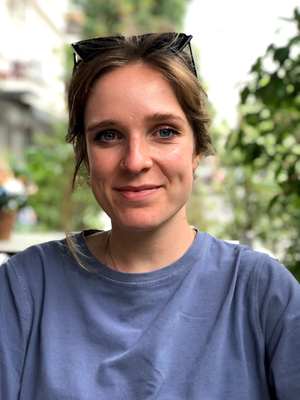Profile of Korinna Lindemann
When it comes to immigration, stereotypes and generalizations abound. Korinna Lindemann has made it her job to fight these kinds of prejudices. Lindemann is a doctoral researcher in the RTG Dynamics research group at Humboldt-Universität zu Berlin and the Hertie School, where she researches the political behavior of immigrants.
Lindemann was originally drawn to political science by the desire to make a difference. “I wanted to do something that could potentially help people and make the world a better place,” she told me. As her studies went on, she realized that effecting change is not so simple, that there are a lot of actors involved in political processes, and that the sources of inequality run deep. Nonetheless, she remained deeply interested in the subject and motivated by a desire to know how things work.
After getting her BA in communication science with a minor in political science at Universität Zürich, she went on to specialize in political science in her MA in Zürich and ultimately to pursue a PhD in the Dynamics research group. Soon after starting her PhD, she noticed a gap in the research. "Some studies suggest that immigrants from certain countries or regions of the world behave a certain way but often don’t explain why. The mechanisms behind these behaviors aren't thoroughly studied. So I wanted to contribute to that, to find similarities in different groups of immigrants and see how they behave, to close this gap a little bit," she told me.
Her dissertation addresses just that—the political behavior of immigrants and how it’s influenced by their experiences in their countries of origin. In the first of three studies in the dissertation, she looks at the political behavior of immigrants coming from authoritarian regimes compared with immigrants coming from established democracies. The expectation was that if an immigrant was socialized in an authoritarian regime with certain ideologies, they would develop a bias against that ideology that would be visible in the destination country. However, that turned out to be true only of immigrants socialized in left-wing authoritarian regimes—immigrants from right-wing authoritarian regimes with no communist past don’t behave very differently from immigrants socialized in established democracies.
Her second study picks up where the first left off—with the anti-left bias of immigrants from communist or ex-communist countries. Using an interactive survey experiment of her own design, Lindemann looks at whether systems with a high amount of wealth redistribution lead to bias against redistributive policies, and under what circumstances that might happen.
Her third dissertation project stems from the observation that the political left and right are understood differently in different parts of the world. While in some countries, a politician’s position on the economy and cultural issues will determine how far left or right they are perceived, in others the concepts of left and right have more to do with the environment. Despite this, the same political scale gets used to compare groups from different regions of the world. The study aims to find out whether and how the socialization of immigrants affects their interpretation of the political left and right.
Lindemann sees filling these kinds of gaps in the research as central to countering injustice. “I think it can lead to a lot of prejudice if you don’t know why people behave in a certain way.” Her hope is that by increasing awareness and understanding of why people behave the way they do and what mechanisms underlie their behavior, she can help pave the way for better integration and less discrimination. “Migration is a big part of today’s societies,” she says. “I would like to see what kind of practices make people more welcoming as opposed to more discriminatory.”
As for what her future holds? After her PhD, Lindemann hopes to continue her work in the subject area. Teaching more, researching integration and discrimination, and continuing to make a difference are all on the agenda. “My work doesn’t need to have impact on the whole world. If it helps someone see things differently, or from a different point of view, that’s already a good thing.”
written by Nad Porter-Kasbati

